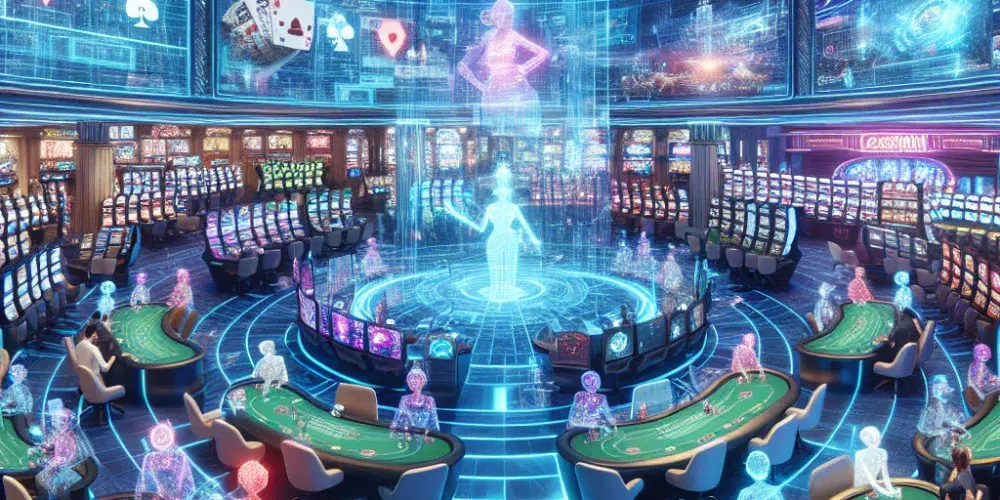The casino industry is on the brink of a technological revolution with the integration of Virtual Reality (VR) technology, reshaping the way players interact with games and offering unmatched immersive experiences. As we head into 2024, VR casinos are not just a novelty but are becoming central to mainstream gaming strategies.
The Rise of VR in the Casino Industry
Virtual Reality technology has been flirting with the casino industry for years, but only recently have we seen significant advancements that could lead to widespread adoption. With improved VR hardware accessibility and sophisticated gaming software, VR casinos are poised to transform the traditional gaming scene by providing a fully immersive environment that replicates the feeling of being in a physical casino.
Industry leaders are leveraging VR to offer gamers everything from blackjack tables to slot machines, all within the comfort of their own homes. The appeal is significant: users can experience the thrill of Las Vegas or Macau without the travel expenses or the crowds.
Key Features of VR Casinos
1. Immersive Gaming Rooms:
Players can walk through elaborately designed rooms and choose from a variety of games. Each environment is crafted to provide a unique atmosphere, much like the differentiated décor found in traditional casinos.
2. Interactivity with Other Players:
Social interaction plays a crucial role in gaming, and VR casinos are capitalizing on this by allowing players to interact with each other in real-time. This can include everything from talking through headsets to reading opponents’ body language in poker games.
3. Realistic Casino Sounds:
Advanced sound engineering provides background casino noises, chatter, and game sounds, enhancing the immersive experience and making players feel like they’re at the center of the action.
4. Personalized Avatars:
Players can create and customize their avatars, adding a personal touch to the gaming experience. This feature also increases the engagement level, making interactions more enjoyable and lively.
The Technological Backbone
The growth of VR casinos is supported by rapid advancements in VR technology. The latest generation of VR headsets offers high-resolution displays and motion tracking, which are crucial for a seamless and engaging casino experience. Moreover, faster internet speeds and more powerful processors ensure that the high data demands of VR gaming are met without lag, which is critical for games where real money is at stake.
Case Study: The Success Story of VR Roulette
Consider the case of VR Roulette, which has become a flagship game for many VR casinos. Players report a high level of satisfaction with the realistic wheel and table layout, along with the ability to watch the ball spin in real-time, mimicking the suspense of a physical roulette wheel. Such positive feedback not only validates the investment in VR technology but also encourages continuous innovation.
Expert Opinions
Industry experts predict that VR could soon account for a significant share of online gambling revenues. “VR casinos offer an engaging way to draw in gamers who seek a more interactive and rich experience, beyond what traditional online platforms or even live dealer games can offer,” says Jonathan Rivers, a gaming technology consultant.
Challenges and Future Outlook
While the potential is vast, there are challenges. The initial setup cost for users — acquiring a VR headset and compatible gaming equipment — can be high. Additionally, developers must continuously work to ensure that the VR gambling experience remains safe and fair for all players.
Looking ahead, as technology becomes cheaper and more accessible, these barriers are expected to lower, making VR casinos an integral part of the online gambling landscape. Continuous innovation and improvement in user experience will likely drive the future growth of this exciting industry.
Key Takeaways
– VR Casinos Offer Unmatched Immersion: They provide a complete sensory experience that replicates being in a physical casino.
– Social Interaction Enhanced: The ability to interact with other players in real-time adds a social dimension missing from traditional online gambling.
– Continuous Innovation is Key: As technology evolves, so too must VR casinos to maintain and grow their user base.
FAQs
Q: How much does it cost to get started with VR gaming in casinos?
A: The cost can vary, typically ranging from $300 to $1000 for a VR headset, plus the cost of any additional gaming equipment.
Q: Are VR casinos regulated?
A: Yes, like all forms of online gambling, VR casinos must adhere to regulatory standards, which vary by jurisdiction.
Q: Can I interact with real dealers in VR casinos?
A: Yes, some VR casinos offer games with real dealers, enhancing the immersive experience by combining VR with live casino elements.
Q: What is the future outlook for VR in casinos?
A: With ongoing technological advancements and a growing focus on user engagement, the future of VR in casinos looks promising and is expected to become a significant part of the gambling industry.
With VR casinos continuing to evolve, they are set to redefine gaming culture significantly, offering players revolutionary ways to gamble, engage, and socialize within a digital landscape.

David Garato is a luminary in gaming journalism, renowned for peeling back the curtain on the gaming world with his witty and insightful commentary. A decade into weaving stories from the pixelated edges of indie games to the expansive universes of AAA titles, David’s work is a thrilling blend of analysis and adventure. When not writing, he’s live-streaming, sharing his gaming exploits with an engaged and growing audience. David doesn’t just write about games; he lives them, making him a trusted guide in the gaming community.


